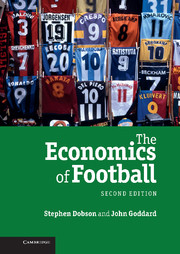Book contents
- Frontmatter
- Contents
- Preface
- Acknowledgements
- List of figures
- List of tables
- 1 Introduction
- 2 The economic theory of professional sports leagues
- 3 Competitive balance, uncertainty of outcome and home-field advantage
- 4 Forecasting models for football match results
- 5 Game theory and football games
- 6 English professional football: historical development and commercial structure
- 7 Determinants of professional footballers' salaries
- 8 Professional footballers: employment patterns and racial discrimination
- 9 The football manager
- 10 The football referee
- 11 Spectator demand for football
- 12 Gambling on football
- 13 Football around the world: France, Germany, Brazil, Japan and China
- 14 The economics of the World Cup
- References
- Index
14 - The economics of the World Cup
Published online by Cambridge University Press: 05 June 2012
- Frontmatter
- Contents
- Preface
- Acknowledgements
- List of figures
- List of tables
- 1 Introduction
- 2 The economic theory of professional sports leagues
- 3 Competitive balance, uncertainty of outcome and home-field advantage
- 4 Forecasting models for football match results
- 5 Game theory and football games
- 6 English professional football: historical development and commercial structure
- 7 Determinants of professional footballers' salaries
- 8 Professional footballers: employment patterns and racial discrimination
- 9 The football manager
- 10 The football referee
- 11 Spectator demand for football
- 12 Gambling on football
- 13 Football around the world: France, Germany, Brazil, Japan and China
- 14 The economics of the World Cup
- References
- Index
Summary
Introduction
Countries compete fiercely for the right to host mega sporting events such as football's World Cup, and the Olympic Games. In order to host a mega event, large volumes of public subsidy are usually required. In this respect, the 1984 Los Angeles and 1996 Atlanta Olympics were exceptional, in having been funded primarily from the private sector. Those who advocate the use of public funding to secure and stage a mega event invariably promise a wide range of benefits for host cities and the host nation, including increased employment and per capita income, as well as less tangible social and cultural benefits deriving from an enhanced local or national reputation. Since the economic benefits are the more tangible, these have tended to receive the most attention from academic and non-academic economists. Indeed, bids to host the World Cup have in recent times been ‘sold’ to the public on the basis of extravagant predictions about the large gains in employment and income that can be anticipated if the bid is successful.
In recent decades, academic economists have gained some experience in evaluating the credibility of claims of this kind, due to a remarkable late twentieth-century boom in the construction of sports stadia for major league sports franchises in North America. Crudely speaking, the public sports strategies of many cities are based on offering taxpayer-funded financial subsidies for investment in sports stadium construction or renovation projects, in an attempt to attract or retain major league franchises.
- Type
- Chapter
- Information
- The Economics of Football , pp. 405 - 422Publisher: Cambridge University PressPrint publication year: 2011



